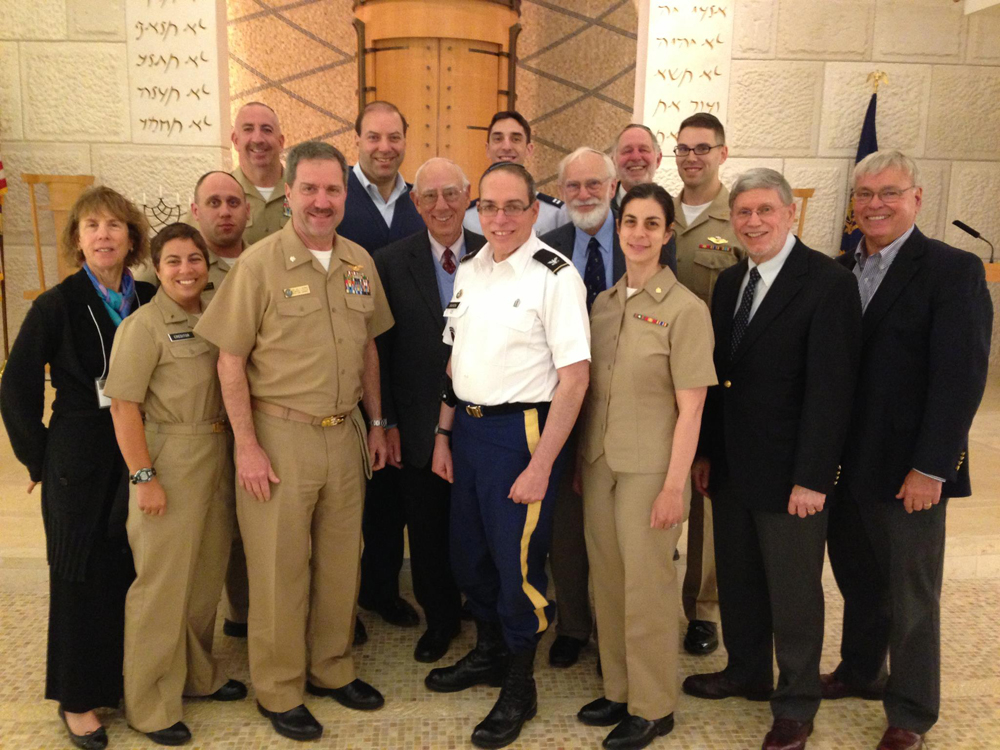By Elliot Salo Schoenberg
 Last week, I was privileged to attend the annual training course and spiritual retreat organized by the Jewish Welfare Board Jewish Chaplains Council and attended by 10 colleagues serving in the United States Armed Forces. Bill Lebeau was the scholar in residence. We met on the campus of the Naval Academy in the beautiful Commodore Uriah P. Levy Center in Annapolis MD. I left with pride in our rabbis and great respect for their mission as some of the 40 rabbis supporting 10,000 Jews serving in the US military.
Last week, I was privileged to attend the annual training course and spiritual retreat organized by the Jewish Welfare Board Jewish Chaplains Council and attended by 10 colleagues serving in the United States Armed Forces. Bill Lebeau was the scholar in residence. We met on the campus of the Naval Academy in the beautiful Commodore Uriah P. Levy Center in Annapolis MD. I left with pride in our rabbis and great respect for their mission as some of the 40 rabbis supporting 10,000 Jews serving in the US military.
We all can learn professional skills from the military experiences of these fine men and woman. Let me share three insights from a talk by the three Chiefs of Chaplains:
 Wear Multiple Hats
Wear Multiple Hats
Chaplain (Major General) Donald L. Rutherford of the U. S. Army shared that military chaplains wear 3 hats every day: Officer, chaplain to all faiths, and rabbi. They are responsible for all those roles, at the same time.
As civilian rabbis; we too are constantly shifting between roles which we need do seamlessly. It is hard work to officiate at a funeral, then prepare a Torah reading and then teach a class of 4th graders all in the same day. Military chaplains teach us that we need to be professional jugglers.
Be Present
The Air Force Chief of Chaplains, Chaplain (Major General) Howard D. Stendahl, told of his visit to a base in Kuwait that was in operation 24/7. It was just as busy at 3 am as 3 pm. He asked the chaplains on duty what services they provided the air men on duty after midnight, their response was silence. The Chief then told the Chaplains that the best thing they could do is to be present at the change of duty. Be at the gate to say hello when the new shift starts. In his experience, soldiers would find those chaplains later if needed because they felt cared for in the moment.
Being present is the beginning of a relationship. Civilian rabbis also need to be present in the lives of our people. Being present shows that we care.
Do Outreach
Chaplain (Rear Admiral) Mark L. Tidd, U.S. Navy, explained that the military is changing and there is a need to do more with less. Chaplains used to recreate a civilian parish on the base. With fewer resources now, the model is to take the parish out into the field. He used the metaphor of a ship, Navy ships are meant to out to sea and not stay in port.
There is great value in taking our rabbinate out of our buildings in to coffee shops, train stations and book stores. "Go forward." Sometimes, even rabbis on land need to go out to sea.
Our deepest appreciation to those rabbis who serve their country and their people in the military. Todah rabah.
Add new comment